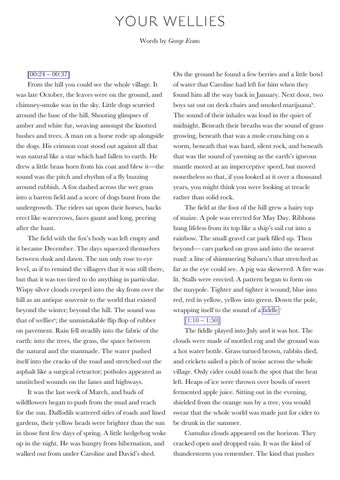YO UR WELLIES Words by George Evans
[00:24 – 00:37] From the hill you could see the whole village. It was late October, the leaves were on the ground, and chimney-smoke was in the sky. Little dogs scurried around the base of the hill. Shooting glimpses of amber and white fur, weaving amongst the knotted bushes and trees. A man on a horse rode up alongside the dogs. His crimson coat stood out against all that was natural like a star which had fallen to earth. He drew a little brass horn from his coat and blew it—the sound was the pitch and rhythm of a fly buzzing around rubbish. A fox dashed across the wet grass into a barren field and a score of dogs burst from the undergrowth. The riders sat upon their horses, backs erect like scarecrows, faces gaunt and long, peering after the hunt. The field with the fox’s body was left empty and it became December. The days squeezed themselves between dusk and dawn. The sun only rose to eye level, as if to remind the villagers that it was still there, but that it was too tired to do anything in particular. Wispy silver clouds creeped into the sky from over the hill as an antique souvenir to the world that existed beyond the winter; beyond the hill. The sound was that of welliesa; the unmistakable flip flop of rubber on pavement. Rain fell steadily into the fabric of the earth: into the trees, the grass, the space between the natural and the manmade. The water pushed itself into the cracks of the road and stretched out the asphalt like a surgical retractor; potholes appeared as unstitched wounds on the lanes and highways. It was the last week of March, and buds of wildflowers began to push from the mud and reach for the sun. Daffodils scattered sides of roads and lined gardens, their yellow heads were brighter than the sun in those first few days of spring. A little hedgehog woke up in the night. He was hungry from hibernation, and walked out from under Caroline and David’s shed.
On the ground he found a few berries and a little bowl of water that Caroline had left for him when they found him all the way back in January. Next door, two boys sat out on deck chairs and smoked marijuanab. The sound of their inhales was loud in the quiet of midnight. Beneath their breaths was the sound of grass growing, beneath that was a mole crunching on a worm, beneath that was hard, silent rock, and beneath that was the sound of yawning as the earth’s igneous mantle moved at an imperceptive speed, but moved nonetheless so that, if you looked at it over a thousand years, you might think you were looking at treacle rather than solid rock. The field at the foot of the hill grew a hairy top of maize. A pole was erected for May Day. Ribbons hung lifeless from its top like a ship’s sail cut into a rainbow. The small gravel car park filled up. Then beyond— cars parked on grass and into the nearest road: a line of shimmering Subaru’s that stretched as far as the eye could see. A pig was skewered. A fire was lit. Stalls were erected. A pattern began to form on the maypole. Tighter and tighter it wound; blue into red, red in yellow, yellow into green. Down the pole, wrapping itself to the sound of a fiddle.c [1:10 – 1:50] The fiddle played into July and it was hot. The clouds were made of mottled rug and the ground was a hot water bottle. Grass turned brown, rabbits died, and crickets sailed a pitch of noise across the whole village. Only cider could touch the spot that the heat left. Heaps of ice were thrown over bowls of sweet fermented apple juice. Sitting out in the evening, shielded from the orange sun by a tree, you would swear that the whole world was made just for cider to be drunk in the summer. Cumulus clouds appeared on the horizon. They cracked open and dropped rain. It was the kind of thunderstorm you remember. The kind that pushes
